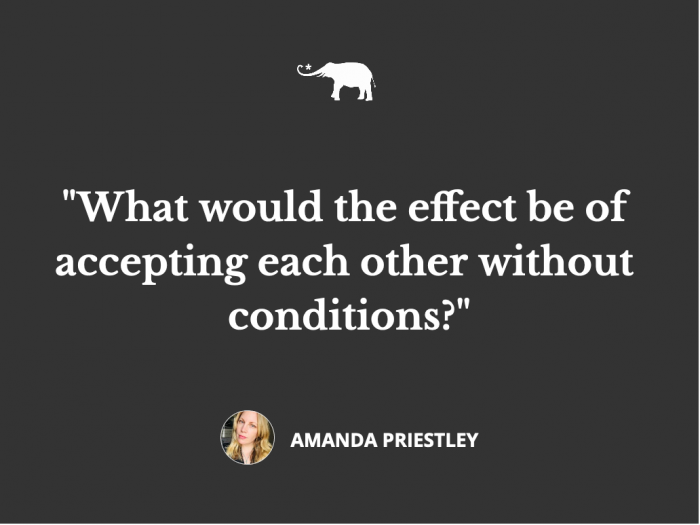View this post on Instagram
Last night, after going around and around about our same sticking points, my husband and I ended up holding each other.
We were both wondering, I suppose, if it were possible to make our way back to each other.
I had recently started down the road of perimenopause (the years before menopause when your periods become irregular, you don’t ovulate every month, and your hormones feel out of whack). As your biological desire to have a baby fades and your estrogen wanes, so does your sex drive. Mine was dangerously low, unmoved by any of the usual tricks.
That was the issue I was bringing to the table.
My husband had gotten into a relationship with me when he was still in college, living in his parents’ house at 26. I was already established in my career and had just bought my own house. The differential in our starting points aggravated his feelings of “less than.”
That issue had surfaced in many different incarnations throughout our relationship.
Last night, I told my husband, “If you could tell me that you didn’t need sex, that you just wanted to connect with me, that I was enough without it, I would feel so loved.” He didn’t say anything.
I let the silence wash over us.
“What would make you feel loved?” I asked him. As soon as I asked it, I felt deeply guilty that I had never truly wondered before.
“Feeling like I didn’t have to prove anything to you, that I didn’t need a job or status,” he replied after a moment.
“So you could quit your job and sit on the couch, and I would love you anyway?”
“Yes,” he said. I wasn’t sure I would love him anyway.
In some ways, our entire relationship had led up to this point. We both came to the relationship with deep insecurities we were hoping the other would fix. If my husband could be with an ultra-competent woman, it would signify he was also a capable man. For me, if I could be partners with a highly sexual man, it would mean I could pass for a desirable woman.
And yet, after 10 years, our deepest yearning was to be accepted despite those insecurities. We ended up back where we started. Instead of trying to compensate for a sexual identity that was lacking, I wanted to be loved without having to fake it. My husband wanted to stop working so hard to prove his worth and just be loved, because.
I felt the power of the conversation; it felt like we had reached the molten lava beneath the surface, where all of the transformative stuff happens. But could we accept each other without those critical pieces? Was my husband as valuable to me without contributing and raising his game to be a hard worker like me? Was I as valuable if we no longer had regular sex?
Truth be told, it wasn’t just the competence or sex issues either. We seemed to find each other precisely for the other’s strength we were missing. When I first met him, I wanted his opposite qualities in my life. But now, I wondered if I was supposed to cultivate them myself, so I didn’t need a partner to complete parts of me. Or is that, in fact, the function of long-term relationships: to help us reclaim parts of ourselves, to help us accept our own vulnerabilities?
Or maybe, it was just a case of mismatched compatibility.
I read a book recently called Radical Acceptance: The Secret to Happy, Lasting Love, and it suggested making a list of all of the parts of your partner that were difficult to accept. Then, one by one, it advised imagining yourself fully embracing those parts. And if you couldn’t, you needed to move on from the relationship because it wasn’t fair to the other person. We need unconditional love to thrive fully.
But what if we accept all of our partners, finally exhale, release the expectations of them to be different, but then we don’t want to be with that person? What if being together is dependent on our image of them, not who they actually are? Our admiration and enjoyment of them aren’t enough to make the unpleasant parts worth it.
As my husband and I released our embrace, I wondered if I could give him the gift of unconditional love and if I would receive it in return. We had reached the end of the ride, having experienced the steep climbs and plunging lows. Knowing intimately what was ahead, was it worth another whirl?











Read 7 comments and reply